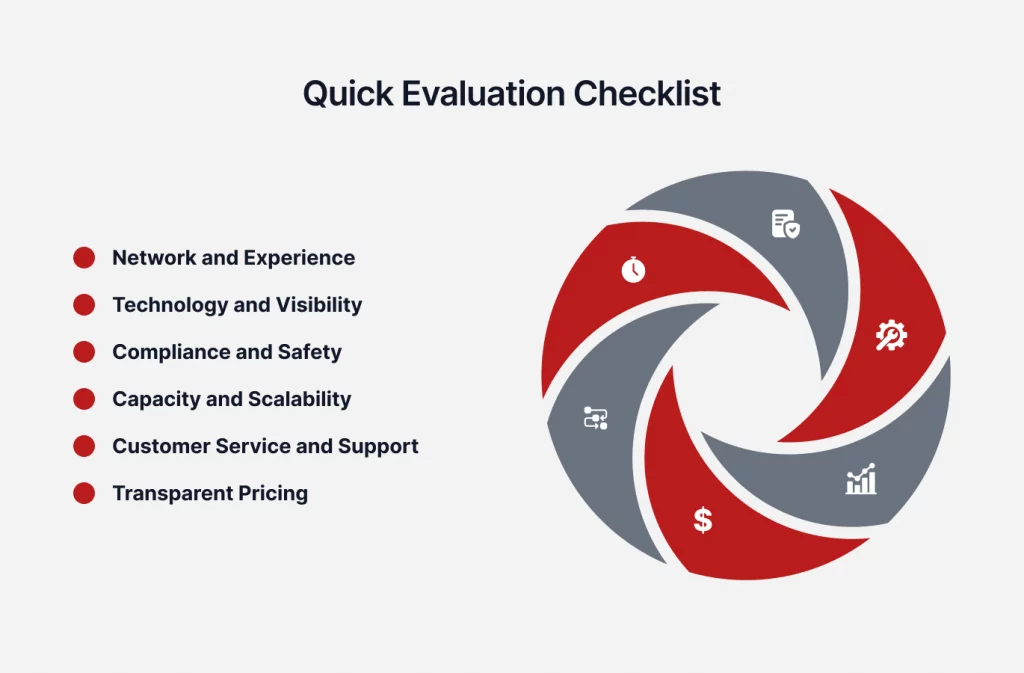Moving goods efficiently across long distances has never been more complex. Today, businesses rely on a combination of rail, road, and port connections to maintain the smooth operation of their supply chains.
This system of combining multiple modes of transport known as intermodal transportation offers cost savings, flexibility, and the ability to scale operations as demand grows.
But success in intermodal logistics depends heavily on the partner you choose. The right company can ensure seamless coordination, predictable pricing, and compliance with industry regulations. The wrong partner, on the other hand, may expose your business to delays, higher costs, and missed opportunities.
This article provides a clear framework for evaluating intermodal transportation companies. By the end, you’ll understand the services they provide, the key factors to look for, and the mistakes to avoid when making your choice.
Key Takeaways
- Intermodal transportation companies play a critical role in connecting rail, road, and port networks.
- The right partner delivers cost efficiency, compliance, scalability, and visibility.
- Businesses should evaluate companies on six factors: network, technology, compliance, scalability, service, and pricing.
- Avoid common mistakes such as choosing only on cost, overlooking compliance, or ignoring scalability.
- Long-term success depends on building partnerships with clear SLAs, regular performance reviews, and mutual trust.
- With strong partners and supportive tools like REACH’s fleet management solutions, businesses can reduce risks, maximize uptime, and gain a competitive edge.
What Intermodal Transportation Companies Do
At its core, an intermodal transportation company manages the movement of goods using two or more modes of transport. The most common combination is rail and truck, but many providers also connect ocean carriers and inland ports.
Their role is to act as a single point of coordination across these different modes, providing businesses with a single partner instead of having to juggle multiple carriers.
Typical services include:
- Containerized freight management: Handling goods in standardized containers that can easily transfer between ships, trains, and trucks.
- Port and rail coordination: Scheduling pickups, drop-offs, and transfers to avoid congestion and delays.
- Cross-docking and warehousing: Streamlining transfers between modes without lengthy storage periods.
- Customs and compliance support: Ensuring shipments meet local, state, and federal requirements.
There are two main types of providers:
- Asset-based companies own the trucks, chassis, or railcars used in transportation. They offer tighter control and reliability but may be limited in geographic coverage.
- Non-asset-based companies act as brokers or third-party logistics providers. They don’t own equipment but leverage broad networks to secure competitive rates and flexible options.
Both models have strengths. The right choice depends on whether you prioritize reliability from owned assets or flexibility from a broad partner network.
Why the Right Partner Matters
Choosing an intermodal transportation company is not just about finding someone who can move containers from one mode to another; it’s also about finding someone who can effectively manage the entire process. It’s about securing a partner who can protect your supply chain against disruptions, support your growth ambitions, and help you consistently meet customer expectations.
1. Cost Optimization
Transportation costs are often among the largest expenses in logistics. A strong partner reduces waste by planning efficient transfers, negotiating favorable rail and port rates, and ensuring containers are not sitting idle at terminals. They also help avoid unnecessary charges such as detention, demurrage, or fuel surcharges that weaker partners may allow to accumulate. Over months and years, these savings translate into measurable improvements in margins.
2. Reliability and Reduced Downtime
Every delay at a port or rail yard creates a ripple effect. A late handoff between modes can cause delays in deliveries to distribution centers and, ultimately, store shelves. Reliable intermodal companies have systems in place to minimize disruptions and contingency plans to keep freight moving even when schedules slip. Their consistency builds resilience into your supply chain.
3. Compliance and Risk Management
The world of transportation is tightly regulated. The Federal Motor Carrier Safety Administration (FMCSA) rules, port security requirements, and rail safety standards must all be followed. Non-compliance can result in costly fines, shipment holds, and damage to a brand’s reputation. A trustworthy intermodal partner ensures compliance is built into operations, giving you peace of mind.
4. Scalability for Growth and Seasonal Demand
Businesses rarely operate at the same shipping volumes throughout the year. Seasonal peaks, market expansion, or sudden spikes in demand test the flexibility of your transportation network. The right intermodal partner can quickly scale capacity by tapping into extended rail slots, chassis pools, or trucking resources, ensuring you never miss opportunities due to a lack of capacity.
5. Technology-Enabled Visibility
Visibility is no longer optional. Without real-time shipment updates, you cannot accurately manage inventory, plan labor at warehouses, or communicate with customers. Leading intermodal transportation companies offer integrated tracking tools that feed data directly into your fleet management systems. This visibility makes decision-making proactive rather than reactive.
6. Customer Experience
Ultimately, the end customer doesn’t care how many modes of transport their product traveled on. They care that it arrives on time and in good condition. By working with a capable intermodal company, you indirectly improve your customer satisfaction scores, brand loyalty, and repeat business.
Scenario Example:
Imagine a consumer electronics company preparing for a major product launch. Containers must arrive from overseas, be transferred from port to rail, and then be distributed by truck to retailers nationwide. A dependable intermodal partner ensures that every step runs smoothly, allowing the launch to proceed without costly delays. A poor partner could cause missed deadlines, empty store shelves, and millions in lost sales.
Key Criteria for Evaluating Intermodal Transportation Companies
When evaluating intermodal partners, businesses need to look beyond surface-level promises. A company that appears cost-effective on paper may fall short in reliability, compliance, or service quality. The right approach is to examine partners across several critical criteria and weigh them against your business priorities.

Pulling It Together
Choosing an intermodal transportation partner is not about checking just one box. You must balance cost, compliance, technology, and service quality. A provider with strong networks but poor customer service may not meet your needs. Likewise, a tech-savvy company without capacity will leave you stranded during peak season.
By assessing partners across these six dimensions, you build a clear picture of who can deliver lasting value and who may expose your business to risk.
How to Shortlist and Compare Companies
After identifying potential intermodal transportation providers, the next step is to narrow them down to the partner that best fits your business. A structured approach helps remove bias and ensures you evaluate partners on measurable factors rather than just price.
Step 1: Build a Criteria Checklist
List the essentials your business cannot compromise on. Examples include nationwide coverage, real-time tracking, compliance records, or transparent pricing. Then create a separate list of “good-to-have” features, such as value-added warehousing or sustainability initiatives. This approach prevents extras from distracting you from the fundamentals.
Step 2: Request Proposals
Send requests for proposals (RFPs) to shortlisted companies. Ask them to outline their network reach, technology platforms, pricing models, compliance processes, and scalability strategies. Proposals create a consistent basis for comparison across providers.
Step 3: Evaluate References and Case Studies
Any established provider should be able to share references from current clients or case studies showing measurable results. Focus on examples from your industry segment, whether retail, manufacturing, or consumer goods. This helps you assess their ability to handle challenges similar to your own.
Step 4: Conduct Trial Runs
Before committing to a long-term contract, test a few shipments with your top candidates to ensure they meet your expectations. Monitor their communication quality, tracking capabilities, on-time performance, and ability to handle exceptions. Trial runs provide real-world insights that proposals cannot.
| Factor | Company A | Company B | Company C |
| Network Coverage | National | Regional | Global |
| Tech Integration | Full API | Limited | None |
| Compliance Record | Strong | Moderate | Weak |
| Scalability | High | Medium | Low |
| Pricing Transparency | Clear | Some gaps | Hidden |
A methodical process ensures you are not just choosing a logistics vendor. You are selecting a long-term partner who aligns with your operational goals. The comparison exercise makes trade-offs easier to visualize and keeps the final decision grounded in evidence rather than assumptions.
Common Mistakes to Avoid
Even experienced logistics teams can stumble when selecting an intermodal transportation company. Avoiding these mistakes will save time, money, and frustration later.
1. Choosing Solely on Cost
Low pricing can be tempting, but it often hides shortcomings such as poor service levels, hidden fees, or limited coverage. A slightly higher upfront cost is worth it if the provider delivers reliability, compliance, and long-term savings.
2. Ignoring Compliance and Safety Records
A partner with weak compliance practices exposes you to regulatory penalties and reputational risks. Always verify FMCSA records, port compliance history, and safety performance before signing a contract.
3. Overlooking Technology Capabilities
Without tracking tools and system integration, your operations team will waste hours chasing updates. Technology-enabled visibility should be a non-negotiable criterion when shortlisting companies.
4. Failing to Plan for Scalability
Some providers handle steady volumes well but falter when faced with seasonal spikes or sudden growth. Confirm in advance whether your partner can access additional capacity when you need it most.
5. Skipping Reference Checks
A polished proposal may look good on paper, but real-world performance is the true measure. Speaking directly with existing customers reveals strengths and weaknesses you will not find in marketing materials.
By avoiding these pitfalls, businesses can approach the selection process with greater clarity and confidence, ensuring their chosen partner adds value rather than risk.
Conclusion
Intermodal transportation has become the backbone of modern supply chains, linking rail, road, and ports into one seamless flow. Yet the benefits of intermodal shipping depend heavily on the company you choose as your partner. The right provider delivers cost efficiency, reliability, compliance, and visibility. The wrong one creates delays, hidden costs, and missed opportunities.
By evaluating providers across network reach, technology integration, compliance practices, scalability, customer service, and pricing transparency, businesses can make smarter choices that safeguard both margins and service quality. Avoiding common mistakes and investing in long-term collaboration ensures the partnership becomes a strategic advantage rather than just a transactional arrangement.
With the right intermodal partner, supply chains become more resilient, customers receive goods on time, and businesses gain a competitive edge. Supported by tools such as REACH’s fleet management solutions, companies can track performance, stay compliant, and maximize uptime while building partnerships that stand the test of time.
Frequently Asked Questions (FAQs)
-
What does an intermodal transportation company do?
An intermodal transportation company coordinates the movement of freight across multiple modes such as rail, truck, and sometimes ocean. They handle container transfers, scheduling, and compliance, ensuring a smooth flow of goods from origin to destination.
-
How do I choose the best intermodal transportation company?
Focus on six key factors: network coverage, technology and visibility, compliance record, scalability, customer service, and transparent pricing. Comparing companies across these areas ensures you select a partner that matches your needs.
-
What are the risks of picking the wrong intermodal partner?
The wrong choice can cause delays, compliance violations, hidden costs, and supply chain disruptions. These issues can lead to missed revenue opportunities and lower customer satisfaction.
-
What is the difference between asset-based and non-asset-based intermodal providers?
Asset-based providers own trucks, chassis, or rail assets. They offer control and reliability but may be limited in coverage. Non-asset-based providers use networks of carriers. They offer flexibility and broader reach but rely on third-party assets.
-
How does technology improve intermodal partnerships?
Technology provides real-time tracking, integration with existing systems, and proactive exception management. This visibility enables businesses to adjust their operations, reduce downtime, and enhance customer communication.



